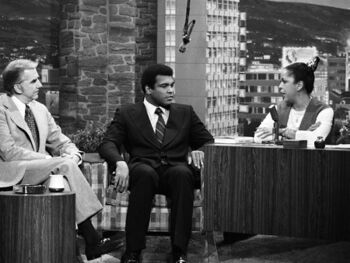Difference between revisions of "Talk show"
(typo) |
(clarification, details) |
||
| Line 10: | Line 10: | ||
|image = Della_Reese.jpg | |image = Della_Reese.jpg | ||
|image_alt = | |image_alt = | ||
| − | |image_caption = | + | |image_caption = Della Reese, America's first black female talk show host in the [[60s]].<ref>http://web.archive.org/web/20210511214528/https://www.nairaland.com/3341176/before-there-oprah-there-della</ref> |
|image_credit = | |image_credit = | ||
|image_ref = | |image_ref = | ||
| Line 19: | Line 19: | ||
|wikipedia = https://en.wikipedia.org/wiki/Talk_show | |wikipedia = https://en.wikipedia.org/wiki/Talk_show | ||
}} | }} | ||
| − | A '''talk show''' is a [[television]] or [[radio]] programming genre structured around the act of "spontaneous" conversation. | + | A '''talk show''' is a [[television]] or [[radio]] programming genre structured around the act of "spontaneous" conversation; so they can deliver an unfiltered exchange of opinions from a wide range of speakers and experts. |
==History== | ==History== | ||
The history of talk shows spans back from the [[1950s]] to current, it has been one of the earliest formats of television broadcasting. In a talk show, one person (or group) discusses various topics under the supervision of a talk show host. This discussion can be in the form of an interview or a simple conversation about important social, political or religious issues and events, among others. The way the host is discussing things during the broadcast shapes the tone and style of the show. | The history of talk shows spans back from the [[1950s]] to current, it has been one of the earliest formats of television broadcasting. In a talk show, one person (or group) discusses various topics under the supervision of a talk show host. This discussion can be in the form of an interview or a simple conversation about important social, political or religious issues and events, among others. The way the host is discussing things during the broadcast shapes the tone and style of the show. | ||
| − | == | + | ==Problems== |
| − | + | [[Television]] (and to a lesser extent [[radio]]) remains a cornerstone for the opinion shaping of a society and is therefore a means to achieve [[social control]]. Like that, talk shows have become an effective way to communicate state policy; in a way that things that have been decided beforehand are sold through the discussion, which is not free but shaped and mostly agreed upon (with the selection of guests for example), as without any alternative, or the best of all alternatives.<ref>As the German journalist [http://archive.today/2020.11.21-212128/https://de.wikipedia.org/wiki/Walter_van_Rossum Walter van Rossum] has demonstrated with his book "Meine Abende mit Sabine Christiansen. Kritik der Talkshow-Kultur" (2004)" / in English: "My evenings with Sabine Christiansen. Criticism of talk show culture", which was one of the prime programs at the time. / [http://archive.today/2018.09.12-140231/https://www.nachdenkseiten.de/?p=375 Book review]</ref> | |
| − | |||
| − | |||
| − | [[ | ||
{{SMWDocs}} | {{SMWDocs}} | ||
Latest revision as of 20:46, 2 October 2022
 | |
A talk show is a television or radio programming genre structured around the act of "spontaneous" conversation; so they can deliver an unfiltered exchange of opinions from a wide range of speakers and experts.
Contents
History
The history of talk shows spans back from the 1950s to current, it has been one of the earliest formats of television broadcasting. In a talk show, one person (or group) discusses various topics under the supervision of a talk show host. This discussion can be in the form of an interview or a simple conversation about important social, political or religious issues and events, among others. The way the host is discussing things during the broadcast shapes the tone and style of the show.
Problems
Television (and to a lesser extent radio) remains a cornerstone for the opinion shaping of a society and is therefore a means to achieve social control. Like that, talk shows have become an effective way to communicate state policy; in a way that things that have been decided beforehand are sold through the discussion, which is not free but shaped and mostly agreed upon (with the selection of guests for example), as without any alternative, or the best of all alternatives.[2]
Examples
| Page name | Description |
|---|---|
| Mika Brzezinski | |
| Piers Morgan | Well known British journalist and TV personality. |
| Mother Of All Talk Shows | |
| Dennis Prager | American conservative radio talk show host, founder of PragerU. |
| Question Time | |
| Michael Ruppert | Former cop who famously confronted John Deutch about CIA drug dealing. Later became a dissident journalist. |
| Laura Lynn Tyler Thompson | Canadian activist and candidate from British Columbia |
| Tucker Carlson Tonight | The most-watched program on cable news |
| Oprah Winfrey | Talk show host |
References
- ↑ http://web.archive.org/web/20210511214528/https://www.nairaland.com/3341176/before-there-oprah-there-della
- ↑ As the German journalist Walter van Rossum has demonstrated with his book "Meine Abende mit Sabine Christiansen. Kritik der Talkshow-Kultur" (2004)" / in English: "My evenings with Sabine Christiansen. Criticism of talk show culture", which was one of the prime programs at the time. / Book review